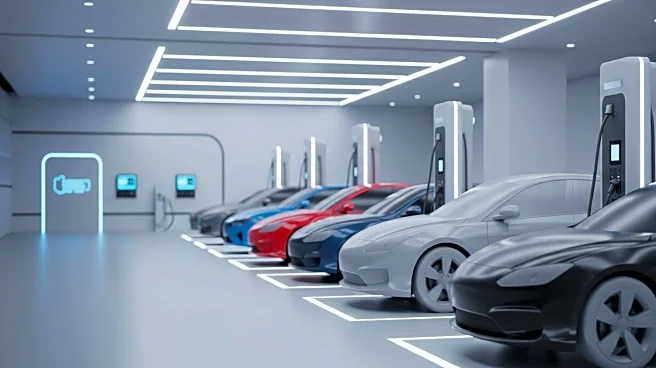What's Happening?
China is revising its subsidy rules for new energy vehicles (NEVs), introducing stricter efficiency and range requirements starting next year. The Ministry of Industry and Information Technology, along with other governmental bodies, announced that only models with over 100 kilometers of pure electric range and lower energy consumption will qualify for tax incentives. This move aims to align with technological advancements and encourage manufacturers to invest in research and development, eliminating outdated products. The new policy requires battery electric cars to meet a national standard that is 11% stricter than previous requirements. Plug-in hybrids must now travel at least 100 kilometers on battery power alone, up from 43 kilometers previously. Industry analysts estimate that about 40% of current plug-in hybrid vehicles in China may not meet the new requirements, potentially leading to end-of-year sales to clear out non-qualifying models.
Why It's Important?
The tightening of NEV incentive requirements in China is significant as it reflects the country's commitment to advancing its electric vehicle industry. By raising technical thresholds, China is pushing automakers to enhance their product offerings, which could lead to increased innovation and higher quality vehicles. This policy shift may impact global automakers operating in China, as they will need to adapt to the new standards to remain competitive. The move also highlights China's strategic approach to reducing emissions and promoting sustainable transportation, which could influence other countries to adopt similar measures. As NEVs account for nearly half of all new car sales in China, the policy could have substantial implications for the global automotive market.
What's Next?
Automakers in China may need to accelerate their research and development efforts to meet the new requirements. Companies might hold sales to clear out models that will no longer qualify for incentives, potentially affecting market dynamics. The policy could lead to a shift in consumer preferences towards models that meet the new standards, impacting sales strategies. Additionally, the global automotive industry may observe China's approach and consider similar measures to enhance vehicle efficiency and reduce emissions. The policy could also prompt discussions on international standards for electric vehicles, influencing future regulatory frameworks.
Beyond the Headlines
The policy change in China could have broader implications for the global push towards sustainable transportation. By setting higher standards, China is positioning itself as a leader in the electric vehicle industry, potentially influencing other countries to follow suit. The move may also encourage technological advancements in battery technology and energy efficiency, contributing to the overall progress in clean energy solutions. Furthermore, the policy could impact the supply chain for electric vehicle components, as manufacturers seek to meet the new requirements.










